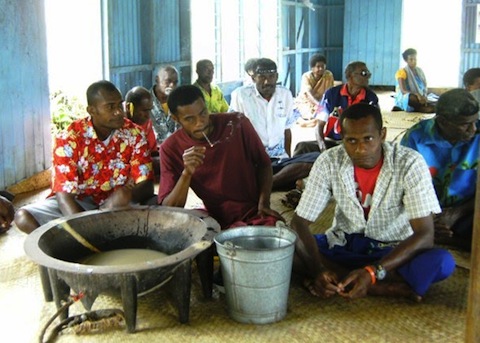
It’s no secret that myriad small Pacific nations are having problems with First World diseases, especially those related to obesity. Fiji’s dictatorial government believes that its citizens’ expanding waistlines are due not only to food consumption, but also to overindulgence in yaqona, a mild intoxicant you may know better as kava:
Fiji’s all-time favourite pastime, yaqona drinking, is under scrutiny because of its contribution to unhealthy living and non-communicable diseases.
Health experts say yaqona sessions in the afternoons should be replaced by physical activities like gardening and exercise.
What some may say is a good way to unwind after a hard day’s work is being described by health officials as a contributing factor to NCDs like diabetes and hypertension.
“We can do without these grog sessions, especially men. They can instead do daily physical activities like gardening and exercise,” says West medical officer Dr Torika Tamani.
By targeting the drinking habits of its urban dwellers, Fiji’s government is opening up a new front in the war on yaqona. Earlier this year, it launched a crackdown against the homebrewing of yaqona in rural areas. But people in towns typically buy from vendors rather than making their own. And they do so not only because they like the gentle buzz of yaqona, but because agricultural realities have made the stuff so darn cheap. Explanation of the economics at work in the yaqona boom here:
Increasingly, yaqona is becoming an important cash crop, grown extensively for commercial sale. In some parts of the country it has become the leading cash crop. In the upper Wainimala, certain villages depend on it for up to 85 per cent of their cash incomes and Sofer has noted its increasing significance in peripheral regions such as Kadavu and Lomaiviti. In Kadavu, Sofer showed that yaqona was replacing copra as the leading cash crop, mainly because it brings higher and more stable returns to producers. Because of the distance and high cost of transport between the outer islands and the main urban markets in Fiji, and because it is relatively non-perishable, yaqona is proving a particularly suitable cash crop for peripheral areas. Other market crops, more perishable, do not reach the urban centres in saleable condition.
The only long-term solution to Fiji’s self-destructive love affair with yaqona, then, is to improve transportation between rural and urban areas, so that farmers can profit by raising more perishable crops. But such development requires both dedication and patience, neither of which the current regime seems to have. And so they will instead attempt to convince young men to forego their daily drinking sessions in favor of gardening. Good luck with that.


Jordan // Nov 29, 2011 at 10:26 pm
At the same time, at least they’re only targeting the consumers right now, not the producers. You’re spot on that the only way to keep people from producing drug crops is to make the economics of other products more attractive. It’s the same problem in Afghanistan and the Andes, only the stakes in Fiji aren’t quite so high just yet.
Brendan I. Koerner // Nov 30, 2011 at 9:35 am
@Jordan: Yes, I think that’s exactly right. But what’s unique to Fiji’s situation is that the crop in question isn’t illegal to grow or possess. It’s profitable simply by virtue of its longevity, which is a big plus in a nation with such poor connections between producers and markets.